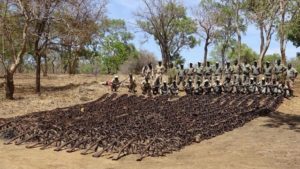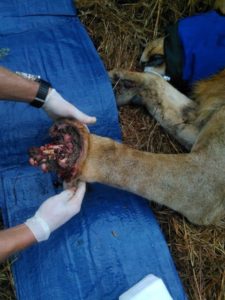by Hannes Wessels
Barrie Duckworth may have shot more elephant than any man alive today. It is a part of his life that he does not regret, nor does he want to talk about it. One of the last of that illustrious band of wild white-hunters, he has lived on the edge in tough places through turbulent times almost all his life. As a Ranger in the Rhodesian Game Department, he was involved in anti-poaching patrols and the elimination of dangerous ‘problem animals.’ He survived the dangerous demands of being a Combat-Tracker in the bush-war that ended in 1980. Since then, he has etched a place for himself, as an icon in the story of African hunting. But like virtually all his peers, it was his love of wild places and wild animals that has driven him all his life.
Having played a pivotal part in the establishment of a successful wildlife conservancy in south-eastern Zimbabwe, Barrie and his colleagues looked east, beyond their borders for a new challenge. They found it in war-ravaged Mozambique, south of the Zambezi on an abandoned hunting concession that once was home to thousands of animals until the end of Portuguese colonial rule. Then came Marxism, lawlessness and civil war which resulted in the decimation of the country’s wildlife. Before Frelimo took control the area was hunted and managed by Adelino Pires who travelled and hunted widely. He described it as one of the finest areas he ever operated in.
It was into these beautiful badlands that Duckworth and family, with his partners, Stu Hulley-Miller and Adamo Valy ventured 18 years, formed Rio Save Safaris, and began their quest to save what was left, protect it and nurture it back to life.
Their problems were massive. Bandits; former Frelimo and Renamo soldiers were resident in the area; armed and dangerous. Elephant poachers were rampant. Thousands of well-hidden gin-traps laced paths and game-trails. Every step taken was a tentative one with potentially dangerous consequences. Making matters worse, a corrupt and sometimes hostile bureaucracy, many of whom had been beneficiaries of the endemic lawlessness, was there to hinder, not help.

Their immediate efforts were aimed at finding and recovering the traps which saw the dispatch of scouts to scour the countryside. They collected thousands and handed them to the authorities, only to find they were simply being passed back to the poachers to assist them in continuing the plunder. Now the devices are rendered unusable. To date, they have recovered close to 10,000 traps.
“These gin-traps are diabolical things,” says Barrie. “Once caught, most die slowly and in excruciating pain but we have, in some cases, been able to rescue and save a few. With the help of a vet we managed to remove one trap from the foot of a lioness, but the damage was too severe, and amputation followed. We treated the stump and she’s gone on to survive and have cubs.


But the elephant hunters kept coming; well-armed with sophisticated weapons and with the connivance of senior officials; their numbers dwindled to alarming levels. Patrols were stepped up and clashes inevitably have followed. In one of these contacts, Senior Scout Ngwenya was killed. Both of my sons have come under heavy fire in the course of our anti-poaching operations. The battle continues and it may never end as the demand for tusks grows inexorably, driven by insatiable Asian demand. “It’s a war out there,” says Duckworth, “and we have to rise to the challenge, but we need strong support from the government otherwise we’re going to lose.”

In a bid to secure the goodwill and support of the locals and encourage them to report illegal activity the company has been channeling a percentage of revenue earned through to the tribal elders. This has been used to boost their crop yields, supply clinics and schools, and for general social welfare. Efforts to relocate people away from high-density game areas have however, received sluggish support from the authorities.
In the course of the development, dams have been built to provide additional permanent water sources to supplement the natural watercourses. This also allows the game to access water away from the rivers where it was concentrated and vulnerable in the dry seasons. To boost numbers and replace species that have been eliminated, Rio Save Safaris has captured and relocated game from Gorongoza and the Zambezi Delta where other hunting companies have saved the buffalo from being wiped out. At one point, these animals were hunted from helicopter gunships for meat, reducing the population from close to 100,000 to 4,000. The population is now over 20,000.
While the wildlife has been under siege, so have the trees. Bearing permits often issued by bent officials, Chinese-backed and managed companies have wiped out most of the old woodlands. The magnificent Mahogany groves have gone to the sawmills and efforts continue to log and process what is left. Days when only the big and older trees were felled have passed; now anything goes to the chainsaw. “We apprehend and confiscate what we can,” says Barrie, “but the damage to the woodlands has been devastating. Unfortunately, like ivory, the demand for hardwoods is too high, the value too great and the incentives for corruption are too tempting for most officials to refuse.”
Despite all the obstacles and hardships, at a rough brush, game populations in the area have increased at least 10-fold since the hunters arrived back in the area and the platform is firmly in place for further population growth. But the most recent threat to continued success, is one largely beyond the control of Duckworth and his company. World-wide anti-hunting sentiment is pressuring Western politicians, including Boris Johnson and Donald Trump, to ban trophies acquired in the course of safari hunting.
In the UK, Zac Goldsmith, the responsible minister in the Johnson cabinet has indicated his strong support for a ban on ‘hunting tourism’ while trotting out a familiar platitude about placing “..a higher value on animals alive rather than dead..” Adding a powerful voice of support for a ban is Carrie Symonds, the PM’s partner who referred to trophy hunting as “. cruel, it is sick, it is cowardly.”
No doubt these remarks drew massive applause from audiences filled with the sort who think like Goldsmith and Symonds. Those ‘opinionistas’ are comfortably distant from the brutal realities of life and death in Africa, and this augments their ignorance. Mostly privileged people who pontificate from afar, from the safety of their pulpits, they are more concerned about proclaiming their virtuousness, than seriously considering the harsh realities of animals struggling to survive on a cruel and lawless continent.
What we witness here, in essence, is yet another grotesque display of selective criticism flowing from the application of manifest double-standards. Because the perceived ‘scoundrels’ are mostly white and wealthy, ‘trophy hunters’ are singled out for special sanction. The fact that they kill a miniscule number of animals, pay heavily for the privilege and finance the protection of these areas is simply ignored. While the people who plant the gin-traps and hunt the elephant; the corrupt officials who facilitate their actions; the Chinese who destroy the forests; attract none of their attention, let alone criticism from Mr. Goldsmith or Ms. Symonds. This is because they are Black and Asian, and the constituency they preach to doesn’t want to hear that side of the story because it’s incongruous with their mindless mindset.
Sadly, if these two succeed in their quest, Barrie Duckworth and his team of brave men and women will soon be gone. The impoverished local people will lose their only source of income, the gin-traps will be back, and the slaughter will resume. But the ‘virtue-signalers’ will be happy.
www.mokoresafaris.com
garyduckworth@mokore.com
Discover more from Africa Unauthorised
Subscribe to get the latest posts sent to your email.



Dear Hannes. Perhaps a book regarding Harry and his team`s hardships and achievements could be something to consider ?
Kind regards.
Rudolf
I was a Zimbabwe licenced professional hunter, now living in NZ. I actually conducted a few hunting safaris in Zambezi Delta, Mozambique, in the early and mid 2000s. I fully agree that it is the sport hunting that finances the care and protection of vast tracts of African wilderness. Yes there are a few corrupt individuals, but that’s across all walks of life.
The best way I could explain what I did to people that objected to what I did was thus.
The land is the resource and is under pressure from man, be it forestry, agriculture, wildlife reserve or hunting concession. The enterprise that generates the most revenue, will be in a position to pay the best price for the land. Whether that is legal, legitimate or best for the environment, is not always the same.
In order to retain vast tracts of land, and maintain the bio diversity, someone, or something has to pay the rent, or pay the dues, to retain that land. Sport trophy hunting is sustainable selective cropping that ensures that trophy elephant bull, or buffalo bull, or whatever species, used to pay the rent, to ensure the rest of the herd, indeed the rest of the entire bio diversity pay their way to ensure their survival. Survival in a world where money tops most other factors.
As a suggestion, perhaps Barry Duckworth and his team invite Mr Holdsworth and Ms Symonds to come and witness for themselves the value of the incredible work people like Barry do in the face of forces far greater than them. By banning their citizens from participating, and helping to finance such operations will kill the golden goose. The very animals and forests they are trying to protect will disappear forever. Are they willing to take responsibility for that.
I agree Travis. People need to see what is happening on the ground but the problem for politicians is they weigh up the political capital they have to expend on taking a stance that’s quickly pounced upon as ‘pro hunting’ or ‘pro killing’ and they balk at it. But if they insist on taking measures to stop hunting then they should come up with an alternative?